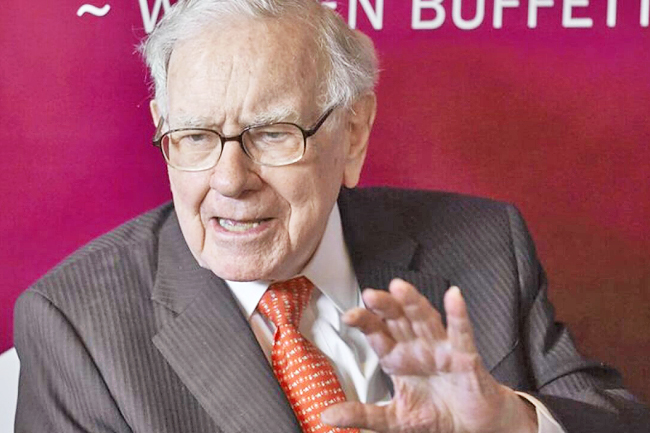OMAHA, NEBRASKA (AP) – Billionaire Warren Buffett said critics of stock buybacks are “either an economic illiterate or a silver-tongued demagogue” or both, and all investors benefit from them as long as they are made at the right prices.
Buffett used part of his annual letter to Berkshire Hathaway shareholders on Saturday to tout the benefits of repurchases that fiery Wall Street critics like Senators Elizabeth Warren and Bernie Sanders and many other Democrats love to criticise. The federal government even added a one per cent tax on buybacks this year after they ballooned to roughly USD1 trillion in 2022.
“When you are told that all repurchases are harmful to shareholders or to the country, or particularly beneficial to CEOs, you are listening to either an economic illiterate or a silver-tongued demagogue (characters that are not mutually exclusive),” wrote Buffett, who himself is a long-time Democrat.
Investor Cole Smead said Washington DC, should take note of Buffett’s view on buybacks.
“Any politician, regardless of the aisle side, should stand up and be at attention to a statement like that,” said Smead, who is with Phoenix-based Smead Capital Management.
Buffett used his typical self-deprecating style to say Berkshire’s remarkable record of doubling the returns of the S&P 500 over the last 58 years with him at the helm is the result of only “about a dozen truly good decisions – that would be about one every five years”.

He recounted a few of those in his letter, but kept his message – which has long been one of the best-read documents in the business world – remarkably brief this year at a little over eight pages. And he devoted an entire page to a tribute to his 99-year-old partner Charlie Munger.
“I think investors – whether they be investors in Berkshire or just students of Berkshire – look to him for more and I think they may come away wanting more,” CFRA Research analyst Cathy Seifert said.
Buffett pointed out how much Berkshire benefits from dividends that it receives from the huge investments in its portfolio like Coca-Cola (Coke) and American Express even though he refuses to pay a dividend at the Omaha, Nebraska-based conglomerate he leads because he believes he can generate a bigger return for shareholders by investing that cash. Coke paid Berkshire USD704 million in dividends last year and American Express added USD302 million, and those payments helped push the value of those stakes to USD25 billion for Coke and USD22 billion for American Express. Berkshire paid USD1.3 billion for each of those investments in the 1990s.
Buffett said the key lesson for investors is that “it takes just a few winners to work wonders.
And, yes, it helps to start early and live into your 90s as well”.
Berkshire said its’ fourth-quarter profit fell sharply to USD18.2 billion from USD39.6 billion a year earlier as the paper value of its investments fell. So those bottom line numbers were again distorted by the value of Berkshire’s sizeable stock portfolio. That’s why Buffett maintains that operating earnings are a better measure of Berkshire’s performance because they exclude derivatives and investments. But by that measure, Berkshire’s operating earnings also declined to USD6.7 billion, or USD4,584.46 per Class A share, from the previous year’s USD7.3 billion, or USD4,904.23 per Class A share.
That’s well below what Wall Street predicted. The three analysts surveyed by FactSet predicted Berkshire would report operating earnings per Class A share of USD5,305.83 on average.







